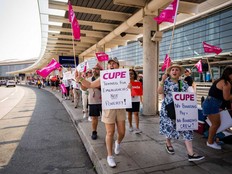LILLEY: Here's the legal reason the Air Canada strike will only end at the table
The days of governments being able to order an end to a strike are over.

Article content
The Air Canada strike is only going to end one way: With a negotiated settlement. The union is defiant, Canadians love to hate Air Canada so much of the public will back the union, and Patty Hajdu’s attempt to force the workers back on the job was an illegal and unconstitutional move.
That’s right, the government was going against the Charter of Rights and Freedoms, or at least how some liberal judges on the Supreme Court interpreted it back in 2015. Back-to-work legislation or using Section 107 of the Canadian Labour Code simply won’t cut it anymore.
“The right to strike is not merely derivative of collective bargaining, it is an indispensable component of that right. It seems to me to be the time to give this conclusion constitutional benediction,” Justice Rosalie Abella wrote in a 2015 decision.
And with those words, Abella upended decades of Canadian jurisprudence that had multiple times said that there was no Charter-protected right to strike. The case, called Saskatchewan Federation of Labour, challenged two provincial laws including one that declared some government workers to be engaged in essential services and not allowed to strike.
In her long and rambling decision, Abella cited British labour practices from the 1700s, British and American labour law, German labour law, and even the European Social Charter to make her political rather than legal case. Even her phrase that “It seems to me to be the time …” shows this was a personal and political decision rather than one based in Canadian law.
In case after case, the Supreme Court had found there was no constitutional right to strike and cautioned against courts imposing strict and rigid laws on a delicate process. In a 2002 decision involving striking Pepsi workers, Chief Justice Beverley McLachlin wrote of the need for courts to be cautious.
“Judging the appropriate balance between employers and unions is a delicate and essentially political matter,” she wrote. “This is the sort of question better dealt with by legislatures than courts. Labour relations is a complex and changing field, and courts should be reluctant to put forward simplistic dictums.”
As recently as 2011, the Supreme Court had rejected that there was a Charter-protected constitutional right to strike. In 2015, led by Abella, the majority on the court, including McLachlin, found that the Charter’s guarantee of the freedom of association in section 2(d) included the right to strike and threw away all precedents.
“The majority has so inflated the right to freedom of association that its scope is now wholly removed from the words of s. 2(d),” the dissenting justices wrote in response to Abella’s decision.
So, although many don’t realize this, tools that governments once used, such as back-to-work legislation, to end disruptive strikes like Air Canada’s current situation are now null and void. Their validity is being fought in the courts and will eventually come down on the side of the unions.
It was for this reason that Ontario Premier Doug Ford used the notwithstanding clause when introducing back-to-work legislation for education workers in 2022. By recognizing the Charter right to strike, Abella took away those tools.
We will likely soon find the minister of labour’s ability to order people into arbitration and to “maintain or secure industrial peace” won’t be considered constitutional either.
Which means that Air Canada and CUPE, representing the striking flight attendants, will continue to battle it out in the court of public opinion. Whichever one can gain the biggest PR win will win at the negotiating table.
This is essentially a political and public relations war between a company and employees, which is why previous court judgments had recommended against the court getting involved in such disputes.
If only the majority in 2015 had listened to their own precedent instead of Abella’s flight of fancy.











Postmedia is committed to maintaining a lively but civil forum for discussion. Please keep comments relevant and respectful. Comments may take up to an hour to appear on the site. You will receive an email if there is a reply to your comment, an update to a thread you follow or if a user you follow comments. Visit our Community Guidelines for more information.